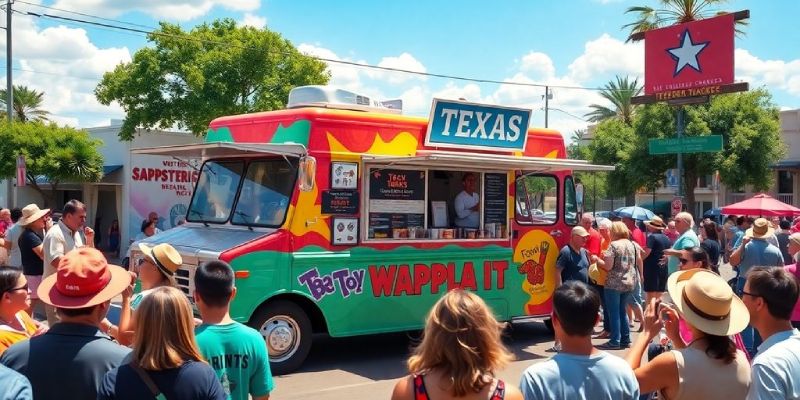Understanding The Food Truck Market
Identifying Your Target Audience
Who are you trying to feed? It’s the first question to ask. Understanding your ideal customer is key.
Think about demographics. Consider age, income, and lifestyle.
Tailor your menu and marketing to them. This is the first step in understanding the food truck market.
Analyzing Local Competition
Who else is out there? What are they serving?
Knowing your competition is super important. Check out their menus and prices.
See what works and what doesn’t. This helps you find your niche in the food truck market.
Exploring Food Trends
What’s hot right now? What are people craving?
Stay up-to-date on the latest food trends. Vegan options? Gourmet tacos?
Adapt your menu to meet demand. This keeps your food truck relevant and exciting.
Crafting A Comprehensive Business Plan
Every food truck needs a solid business plan. It’s more than just a formality; it’s the roadmap to success. A well-thought-out plan helps secure funding and guides daily operations.
Defining Your Food Truck Concept
What makes your food truck special? Clearly define your niche. This includes your menu, target audience, and unique selling points.
Think about what kind of food you want to serve. Consider the local tastes and what’s missing in the market. A strong concept is the foundation of your business plan.
Setting Financial Projections
Numbers matter. Estimate startup costs, revenue, and expenses.
Create realistic financial forecasts for the first few years. Include details like equipment costs, permit fees, and marketing expenses. Accurate financial projections are key to attracting investors.
Outlining Marketing Strategies
How will people find your food truck? Develop a marketing plan that includes online and offline strategies.
Consider social media, local events, and partnerships. A strong marketing plan helps build brand awareness and attract customers. Don’t forget to include a budget for marketing activities in your business plan.
Securing Necessary Permits And Licenses
Starting a food truck means dealing with permits and licenses. It’s not the most fun part, but it’s super important to get it right. Operating without the correct paperwork can lead to fines or even getting shut down.
Understanding Local Regulations
Each city and county in Texas has its own rules. It’s important to research the specific regulations for each location where you plan to operate. This includes everything from where you can park to what kind of food you can sell.
- Check city websites.
- Attend local food truck meetings.
- Talk to other food truck owners.
Obtaining Health Permits
Health permits and licenses are non-negotiable. These ensure your food truck meets health and safety standards. Expect inspections and be ready to show you know how to handle food safely.
- Food safety training is often required.
- Regular inspections are part of the process.
- Be prepared to show your food handling procedures.
Navigating Zoning Laws
Zoning laws dictate where you can legally park and operate your food truck. Some areas might be off-limits, while others might require special permission. Understanding these laws is key to avoiding problems.
Ignoring zoning laws can lead to fines and forced relocation. It’s better to do your homework upfront. Make sure you know where you can and cannot operate before setting up shop.
- Research zoning maps.
- Contact the local zoning office.
- Get written confirmation of approved locations.
Funding Your Food Truck Venture
Starting a food truck isn’t cheap. Figuring out funding is a big deal. Let’s look at some ways to get the cash you need. It’s all about making that dream of How to start a food truck in Texas a reality.
Exploring Traditional Financing Options
Bank loans are a classic choice. They give you a big chunk of money upfront. SBA loans are another option, often with better terms. You’ll need a solid business plan to convince them you’re a good risk.
Think about a business line of credit too. It lets you borrow money as you need it. This can be super helpful for covering unexpected costs.
Considering Alternative Funding Sources
Crowdfunding can be a cool way to raise money. You pitch your idea online and people donate. It’s like a pre-sale for your food.
Restaurant incubator programs are another possibility. They offer funding, mentorship, and resources. It’s like a crash course in the food business.
Equipment financing is also worth checking out. It helps you get the gear you need without a huge upfront cost.
Finding Investors or Partners
Private investors might be interested. They give you money in exchange for a share of your business. Friends and family can also be investors.
Finding a partner can ease the financial burden. They bring in cash and share the workload. Just make sure you’re on the same page about everything.
Consider renting equipment to lower initial costs. This is a smart way to launch your food truck without a substantial budget. It’s all about making smart choices when figuring out How to start a food truck in Texas.
Choosing The Right Food Truck And Equipment
Deciding Between New or Used Trucks
Choosing a food truck is a big deal. New trucks offer reliability and customization. Used trucks can save money upfront, but might need repairs.
Consider your budget and long-term plans. A new food truck could cost more initially but have fewer maintenance issues. A used one might be cheaper but require more upkeep.
Think about the specific features you need. Do you want a custom layout? Or is a standard setup okay?
Essential Kitchen Equipment
Equipping your food truck is key. You’ll need the right tools to cook and serve your food. Prioritize equipment based on your menu.
Consider things like grills, fryers, refrigerators, and prep stations. Don’t forget about safety equipment like fire extinguishers. Space is limited, so choose wisely.
Quality equipment can improve efficiency and food quality. It’s worth investing in reliable brands.
Designing Your Food Truck Layout
A well-designed layout is essential. It maximizes space and efficiency. Think about workflow and safety.
Consider the placement of equipment and storage. Make sure there’s enough room for staff to move around. A good layout can improve service speed.
Plan for easy cleaning and maintenance. A clean and organized food truck is a happy food truck.
Developing A Strong Brand Identity
It’s time to make your food truck unforgettable. A strong brand identity helps customers remember you. It’s more than just a logo; it’s the whole package.
Think about what makes your food truck special. What feeling do you want customers to have? This will guide your brand identity.
Consistency is key. Use the same colors, fonts, and voice everywhere.
Creating A Memorable Logo
Your logo is the face of your food truck. It should be simple, recognizable, and relevant to your food. Think about colors and fonts that match your style.
Consider hiring a professional designer. A good logo is worth the investment. It will make your truck look more professional.
Test your logo with potential customers. Get feedback on what they think and feel.
Establishing Your Online Presence
Get online! A website and social media are must-haves. Share your menu, location, and hours.
Post regularly and engage with your followers. Run contests and promotions. Show off your food!
Use high-quality photos and videos. Make your food look irresistible.
Engaging With Your Community
Get involved in local events. Sponsor a sports team or charity. Show that you care.
Offer discounts to local businesses. Partner with other food trucks. Build relationships.
Listen to your customers. Respond to their feedback. Make them feel valued.
Planning Your Launch Strategy

Setting A Launch Date
Picking the right day is key. Think about local events, weather, and even holidays. A well-chosen date can really boost your initial sales.
Consider weekends or days with community events. Avoid dates that might conflict with other big happenings in town. A good launch date sets the tone.
Don’t rush it! Give yourself enough time to prepare everything. A smooth launch is better than a fast, messy one.
Marketing Your Grand Opening
Get the word out early and often. Use social media, local newspapers, and even flyers. Let people know you’re coming!
Offer special deals or discounts for your grand opening. Everyone loves a good deal. Make sure to highlight your unique food truck concept.
Think about a small event with music or games. Make it fun and memorable. A successful launch strategy includes great marketing.
Building Customer Relationships
Be friendly and welcoming to everyone. First impressions matter a lot. Remember, repeat customers are the best.
Ask for feedback and listen to what people say. Use their suggestions to improve. Good service keeps people coming back.
Consider starting a loyalty program or offering rewards. This encourages repeat business and builds a strong customer base. It’s all about making people feel valued.
Engage with your community online and offline. Respond to comments and messages. Show that you care about your customers.
Wrapping It Up
Starting a food truck in Texas can be an exciting journey. It’s not just about cooking; it’s about planning, getting the right permits, and finding your niche. Remember to do your homework on the market and create a solid business plan. Don’t forget to secure funding, whether through loans, investors, or even renting equipment to keep costs down. Once you hit the road, focus on building your brand and connecting with your community. With the right approach, your food truck can become a beloved part of the local scene. So, roll up your sleeves, get cooking, and enjoy the ride!















